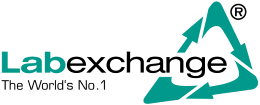Ciphergen PBS II
| Objektnummer | B00007309 |
|---|---|
| Numéro d'identification | 007309 |
| Nom de l'objet | Ciphergen PBS II |
| Statut | Stock unit |
Groupe de produits: Life science / Biotechnologie
Statut, conditions de livraison et de paiement
Vérification des appareils
Les appareils d’occasion sont vérifiés par Labexchange Service GmbH avant la livraison. Vous recevez des appareils entièrement fonctionnels.
Délai d'expédition
Les délais de livraison indiqués sont les plus rapides pour l’article en cause. Les délais de fait peuvent varier au cas par cas. Les délais de livraison définitifs sont indiqués dans la confirmation de commande.
Nous offrons des livraisons collectives par principe. Le délai de livraison s’oriente à l’article avec le délai de livraison le plus long. Une livraison partielle est possible par prix additionnel.
Méthodes d'expédition
Courrier, agences d'expédition, autocueillette, livraison par flotte de Labexchange
Conditions de livraison
Prix plus frais d’expédition. Les frais d’expédition indiqués sont à prévoir. Dérogations éventuelles sont possibles.
Si les coûts de transport ne sont pas spécifiés, s'il vous plaît demander séparément les frais de transport. Les frais de transport et d'emballage indiqués se réfèrent à l'itinéraire de transport le moins cher et sont sujets à des augmentations de coûts imprévues. En raison d'événements imprévisibles, les tarifs de transport et les délais de livraison peuvent changer à tout moment et doivent être adaptés à la situation actuelle. Incoterm codage selon les Incoterms 2010: Pour personnes qui viennent chercher les dispositifs elles-mêmes: EXW, pour les expéditions par voie maritime: CFR, par avion: CPT, d'autres expéditions: DAP. Remarque: Nous n'établissons pas des preuves préférentielles/EUR1. Dans le cas d’un enlèvement par vos soins/EXW de pays à l’intérieur ou à l’extérieur de la Union européenne, nous devons conserver 16% de TVA d’acheteur comme dépôt de garantie, jusqu’à ce que nous ayons reçu l’attestation de reception/la prevue de livraison.
Modalités de paiement
Nous n’acceptons pas le paiement par lettre de credit, PayPal, etc. Dans tous les cas le montant est payable sans déduction. Jusqu’au paiement complèt l’équipement reste notre propriété. Un escompte n’est pas accordé.
|
Pays |
Modalités de paiement possible |
Remarque |
|
DE, AT, CH |
Paiement par facture, prépaiement, par carte de credit |
Paiement par facture est possible pour clients professionnels. |
|
NL, BE, LU |
Paiement par facture, prépaiement, par carte de credit |
Paiement par facture est possible pour clients professionnels. |
|
Autre pays |
Prépaiement, par carte de credit |
|
Nos conditions de vente, de livraison et de paiement sont en vigueur. Vous pouvez télécharger les documents ici.
La vente intermédiaire nous est réservée.
Défintion des statuts
Tous articles sont d’occasion, sauf si explicitement défini comme « appareil neuf ».
|
Statut |
Condition |
Remarque |
|
Immédiatement disponible |
Occasion |
L’article a été déjà entièrement vérifié et peut être envoyé directement à vous. |
| En stock |
Occasion |
L'article est en notre stock, mais doit être vérifié avant la livraison par nos techniciens Vous recevez des articles entièrement fonctionnels. |
|
Publié |
Occasion |
L’article est toujours au l’offreur. Nous achetons, vérifions et en fin livrons l’article après votre commande. Le certificat de fonctionnement ainsi que le rapport de service sont inclus à la livraison. |
|
Appareil neuf |
Neuf |
C’est un dispositif neuf. L’article n’est pas utilisé et neuf d’usine. En ce qui concerne des article neufs, la garantie du fabricant est valable. |
|
Labprocure |
Occasion |
Responsable du contenu de l‘offre d’appareil est la société Labprocure GmbH, comme annonceur. Labprocure assume la responsabilité des offres annoncées ici ainsi que des photos et des textes d’offre inclus. Labprocure GmbH, Bruckstraße 58, 72393 Burladingen. |
The ProteinChip System
Ciphergen's ProteinChip System is comprised of a ProteinChip Reader (series PBS II) integrated with ProteinChip Software and a personal computer to analyze proteins captured on ProteinChip Arrays. The ProteinChip System detects and accurately calculates the mass of compounds ranging from small molecules and peptides of less than 1000 Da up to proteins of 500 kDa or more based on measured time-of-flight. The System is compact enough to fit into almost any lab space, allowing researchers direct access to precision mass analysis of important peptides and proteins from complex biological samples.
ProteinChip Arrays
Ciphergen's ProteinChip Arrays distinguish this technology from other mass spectrometry-based analytical Systems. ProteinChip Arrays provide a variety of surface chemistries that allow researchers to optimize protein capture and analysis. The surface chemistries of the arrays include a series of classic chromatographic chemistries and specialized affinity capture surfaces. Classic chromatographic surfaces include normal phase for generic protein binding; hydrophobic surfaces for reversed-phase capture; cation- and anion-exchange surfaces; and immobilized metal affinity capture (IMAC) for metal-binding proteins. Specific proteins of interest can be covalently immobilized on pre-activated surface arrays, enabling customized experiments to investigate antibody-antigen, DNA-protein, receptor-ligand, and other molecular interactions.
The ProteinChip Reader (Series PBS II)
The ProteinChip Reader is a laser desorption/ionization time-of-flight mass spectrometer that uses state-of-the-art ion optic and laser optic technology. The laser optics maximize ion extraction efficiency over the greatest possible sample area, and thus increase analytical sensitivity and reproducibility. The Reader's ion optics incorporate a four-stage, time-lag-focusing ion lens assembly that provides precise, accurate molecular weight determination with excellent mass sensitivity.
The ProteinChip Software
Ciphergen's ProteinChip Software controls all aspects of the ProteinChip Reader and facilitates data collection and analysis. The Software uses a Microsoft Windows NT interface, and contains numerous features, including automatic reading of ProteinChip Arrays; multiple spectrum comparison for differential protein display and biomarker discovery; several alternative viewing formats for data; and a user-friendly interface.
Technical Specifications
The ProteinChip Reader is a linear laser desorption/ionization time of flight mass spectrometer.
Enclosure
Floor-standing unit with castors.
Dimensions: 98 cm (38.5") wide x 56 cm (22") deep x 71 cm (28") high.
Mass: 145 kg (320 pounds).
Mass Analysis Range
From less than 0.1 kDa to greater than 500 kDa.
Sensitivity
Better than 300:1 average signal to noise ratio on the analysis of 50 femtomole of bovine IgG when digitally smoothed with a (0.2 times peak width) sliding window average.
Mass Resolving Power
Automatic Mode
Better than 600 average resolution for 10 "spot protocol" automated 25-shot averages of 5 picomole of human recombinant insulin.
Manual Mode
Isotopic envelope limited resolution of better than 1000 for the analysis of 5 picomole of human recombinant insulin.
Mass Accuracy
Internat Calibration, Absolute
Better than 0.02% absolute error for eight measurements of 1 picomole of bovine insulin B chain calibrated against somatostatin and human recombinant insulin on an 8-position, "A-H," normal phase ProteinChip.
Internat Calibration, Averaged 1
Better than ± 0.5 Da 0.5 to 5 kDa
Better than ± 200 ppm (0.02%) 5 kDa to 10 kDa
Better than ± 500 ppm, (0.05%) 10 kDa to 300 kDa
External Calibration, Absolute
Better than 0.1% average absolute error for seven analyses of human angiotensin I, somatostatin, bovine insulin B chain, and recombinant human insulin (~1 picomole each) as analyzed on an 8-position, "A-H," normal phase ProteinChip in which spot D is used as a calibration run.
External Calibration, Averaged 2
Better than ± 1 Da 0.5 to 1 kDa
Better than ± 1000 ppm (0.1%) 1 kDa to 10 kDa
Better than ± 2000 ppm (0.2%) 10 kDa to 300 kDa
Ion Source
Laser desorption ionization
Radial-focusing electrostatic optics
Operating voltage: 0- ±20 kV (standard software selectable settings: +20 kV, +6 kV, -6 kV)
Factory burn-in: stable to ±30 kV at termination of conditioning procedure
Flight Tube
0.8 m
Ion Detector
Minimum peak width <8 ns
Linear dynamic range: linear output to 10 9 electrons (500 mV for a 10 ns pulse)
Large-pulse recovery <30 ns
Noise <2 mV rms 0-125 MHz
Transient Digitizer
Trigger jitter: < 2 ns
Aperture jitter: <10 ps
Sampling rate: 250 MS/s or 500 MS/s
Record length: >2 ms
Input amplifiers: multi-gain linear and logarithmic
Dynamic Range
8 bits (256 signal intensity levels per scan on board; 32 bit signal averaging on computer)
Linear dynamic range software controlled in 9 steps (3-4 dB/ step) from -0.020 V to -1 V full-scale
Logarithmic dynamic range, 0 to 1 V
High Voltage Pulser
Trigger jitter: <1 ns
Lag time: 0.17-5 seconds
Pulse height: 0-5 kV
Polarity: selectable under computer control
Risetime: 100 V/ns
Pulse width: 0.1-25_seconds
Laser
Pulsed nitrogen laser (337 nm) 4 ns pulse width
Intensity adjustment: 300 steps full-scaled 0-150 mJ logarithmic.
Spot size: 200 mm x 1000 mm
Maximum pulse rate 10 Hz
Sample Handling
Linear sample arrays on 9 mm x 78.5 mm x 2.4 mm (72 mm accessible for analysis)
Vacuum load-lock for rapid sample introduction (<3 minutes from insertion to data acquisition)
Vacuum System
Base pressure <2 x 10 -7 torr (no baking).
Pressure less than 1 x 10 -6 immediately after sample exchange.
250 L/second high compression turbomolecular pump with two-stage rotary-vane backing pump.
Gauges: active inverted magnetron (high vacuum) and active pirani (low vacuum)
Control System
Windows NT-based software for automated instrument operation and data analysis
High end personal computer and monitor
GPIB interface with >750 MB/s peak data transfer rate
Data rate: 1-4 spectra per second; Analysis of one "A-H" ProteinChip Array with eight 50-spectrum averages takes approximately 10 minutes.
Supply Voltage
110-120 VAC, 10A or 220-240 VAC, 5A 50-60 Hz; 100 VAC available as option.





